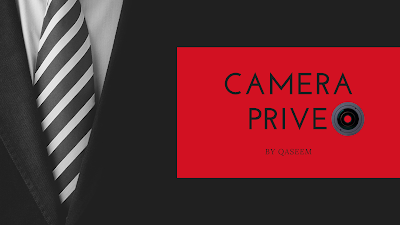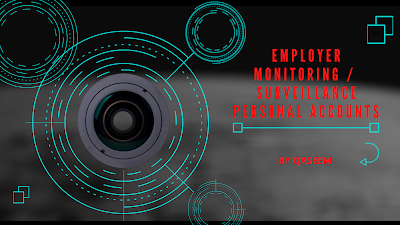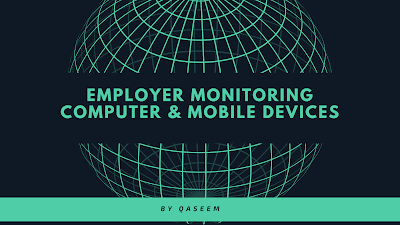Camera Prive.
 |
Camera Prive
|
Social media is blurring the boundaries between public and private. They are making it more challenging than ever to respect your employee's privacy rights.
Still, employers have a vested interest in knowing what's going on with their staff members, especially during work hours. But just because a manager can listen to what an employee says doesn't mean they should or that listening is lawful.
Employees have privacy rights when using social media and other online communication tools at work, even if their behaviour might be subject to disciplinary action.
So employers need to know where to draw the lines between what they are allowed to listen to monitor and ask and what's off-limits and protected by privacy laws. This information is focused on helping you understand where those lines are drawn.
I'm going to show you how not to overstep your legal limits for monitoring how your employees use social media and other digital communications at work.
You're going to learn what employers can and can't monitor privacy issues surrounding an employee's personal use of social media.
The use of smartphones tablets and computers for social networking on the job.
When and how employers can investigate an employee's misconduct on social media both on duty and off. And much much more.
We'll look at the risks of using social media to screen job applicants and monitor employees' personal communications.
We'll cover newer laws that prohibit employees from demanding usernames and passwords from job candidates and existing employees. And we'll close with the discussion of the situations where an employer could be able to override an employee's right to privacy.
This information is one of the many social media literacy and compliance information from complying socially.
We maintain the largest, broadest deepest catalogue of social media training horses.
The information presented in this article is designed primarily for U.S. based individuals.
Social media it's really just another communication channel. It's a way to express yourself, connect with others, publish your work, and even promote things and ideas. But unlike having a phone conversation talking on the street or sending an email.
Social media is public, so it can reach a lot of people spread quickly and result in a permanent record of what you said and did. And that record can be found through a search engine for a very long time.
So if you use common sense and good judgment, social media can be an excellent tool for collaboration interaction and sharing. Still, social media is a way to create evidence that can be used against you or your employer without common knowledge and useful experience.
This information provides insight into the benefits and risks of communicating in public. We can give you the tools to use social media and other communication channels effectively and responsibly and help you see and hopefully avoid the unintended consequences.
Part of the information is to explain what laws may apply. And part of the data is to provide you with the questions to ask as you decide how you want to use social media for work compile socially is not giving you legal advice.
Determining best practices are telling you what to say or do. One of the real values of social media is that it's less formal, more personal, spontaneous, and real. We're here to educate you so you can use social media in ways that work for you.
We also want to remind you that there's no way for us to anticipate or discuss every situation that might arise, but we hope to get you to ask the right questions. And when you have a question on what to do or how to handle something, we encourage you to talk to someone familiar with the legal and practical issues for your situation.
Different states, cities, and companies have different laws and rules that apply. So if you're not sure, ask before you act.
Common Law Privacy Review.
 |
Common Law Privacy Review.
|
Some states have specific constitutional privacy protections others have laws passed by the legislature protecting one form of privacy or another.
But even in those states, they don't have specific privacy laws on the books.
Employees still have some privacy rights that are based on court cases and the U.S. Constitution's rights relating to personal freedoms and the right to be free from government intrusions.
All states generally recognize that everyone has an expectation of privacy about certain areas of their life; physical and sexual privacy means that other people should not be able to see naked without your permission.
And even with your permission, their privacy may protect them from having to see you naked unless they want to.
We have a right to privacy in our homes to do the things we want to do without surveillance or interference unless it's illegal legal. We have a right to medical privacy, which means the privacy of our personal health information employees isn't usually required to disclose that information.
And importers generally can't share an employee's medical information with another person.
And we all have the right to financial privacy, which is the personal privacy of our tax records and personal finances except when there's a legitimate need to know to decide whether someone's privacy has been violated.
Courts usually ask three questions.
- Whether the employee had a reasonable expectation of privacy?
- Whether the intrusion was significant?
- Whether there's a good reason for the intrusion?
It's not always clear what the court will decide because no two situations are exactly alike. The court tries to evaluate whether the intrusion was reasonable under the circumstances and whether one party's rights outweigh the others?
In Illinois, a state court found a major retailer liable for privacy invasion after one of its stores hired fake undercover employees who recorded conversations outside of the workplace.
According to the court, information obtained through deception isn't voluntary information, and if the information isn't disclosed voluntarily, then it's not unreasonable for the person who disclosed it to still expect to maintain some degree of privacy or that information.
For example, it is logical that an employee would have a reasonable expectation that their conversations with coworkers would remain semi-private.
If you share intimate life details with a coworker, and those details were shared with and published by your employer that would violate your reasonable expectation of privacy.
Now that case took place outside the realm of social media. But it's easy to imagine how a similar scenario could play out on a social network.
Employer monitoring of employee communications, both work-related and personal, is a sensitive issue. We're going to break down the issue into three main categories for the purposes of our training. We'll start with an overview of the main issues employers face then we'll move on to a specific discussion about employee's personal e-mail and social media accounts.
Finally, in the third section on monitoring, we'll consider what employers can and can't do when it comes to computers and mobile devices.
Let's begin with a basic rule. If the employer owns the system in question, whether it's hardware like computers and mobile devices or software like interoffice messaging or voice mail applications, the employer can monitor employees' use of the system, including personal files and communications that pass through the system.
There are limitations to this right. For instance, employers can't monitor employees continuously if a call is obviously personal. The employer has to stop listening, but that doesn't stop an employer from disciplining employees, for making personal calls, and sending personal e-mails on the employer's time.
An employer can continuously monitor an employee and use of an employer's network even when that use is personal. They just have to stop listening or capturing the content of those communications if their personal as an employer or manager.
It's perfectly acceptable to keep records of how long an employee used a network or phone system for personal communications, as well as who they called and when. only, an employer can monitor an employee's address book.
If that address book is stored on an employee's computer network or e-mail service, if the employee owns the system in hardware, the employer can sometimes view and obtain personal files. Usually, when the employee is using it at work and if the employer has a legitimate interest in viewing the communication, We'll discuss when employers have an interest later.
However, the employer's right or interest in viewing their communication may be further limited by internal policy state law—federal laws, including the National Labor Relations Act and the employee's reasonable expectation of privacy.
Social media hides the lines between work and personal. Plus, successful social media strategies leverage human engagement to humanize and personalize organizations manage reputations and help build positive word of mouth.
So it's important to remember that just because an employer can legally monitor something doesn't mean they should. If an employer wants a relaxed work environment where employees are trusted and treated as grownups, then monitoring and disciplining employees over personal phone calls and computer use could seriously undermine both employee engagement and social media use.
But if employees have access to sensitive information such as trade secrets are personally identifiable information than monitoring may be necessary to protect competitive information or as part of a contract. Organizations need to make it clear to their employees what their monitoring practices are.
The rationale for monitoring employee communications and why it's necessary to be upfront with your employees about what your policies tell them what you're going to monitor and why two employees of a restaurant set up a password-protected chat room to vent about their job.
Manager access the site discovered remarks by the employees that criticized management delved into sexual matters and talked about illegal drugs.
The restaurant fired the employees who then sued the restaurant for violation of the federal stored communications act, which restricts intentionally accessing stored communications without proper authorization.
A jury ruled in favour of the fired employees finding that the manager had gone too far in accessing the chat room.
Employer Monitoring / Surveillance Personal Accounts.
 |
Employer Monitoring / Surveillance Personal Accounts.
|
Also, employees usually have a reasonable expectation of privacy when it comes to email accounts. On the other hand, employees need to exercise care in using those accounts and passwords on the employer
owned equipment employees' personal information, including passwords, can be stored in backups invisible to monitoring software.
That means the information may not be so private after all. Court decisions have come down on both sides of this issue. The most well-known case involved an employee contacting her lawyer by personal yahoo email using a company computer. The employer retrieved the e-mail. The firm maintained an internal policy that all matters on company media systems and services are not to be considered private.
The New Jersey court found the emails were protected under the doctrine of attorney-client privilege. The court also said the very existence of attorney-client privilege created a reasonable expectation
of privacy. So the emails were off-limits to the employer because both attorney-client privilege and the employee's reasonable expectation of privacy, on the other hand.
A California court said an employee waived the attorney-client privilege and any expectation of privacy by sending an e-mail to her lawyer on a company computer via a company email account that firm's policy
also prohibited the use of company computers for personal purposes.
In Georgia, a court found that an employer did not violate an employee's rights by accessing their personal computer-based on evidence that the employee was operating a side business using that computer on company
time.
The employee had to pay the employer damages. The result of that case, all of these cases, of course, deal with monitoring employee activity on the job. Generally speaking, employers should not monitor employees when they're not on the job. However, telecommuting and flex hours make these distinctions less easy to pin down in today's workforce.
Employers should think carefully about monitoring employees' activities, and they should avoid monitoring off duty activities. Employees do have a reasonable expectation that their off duty social media activity will be off-limits to their boss or manager monitoring, this kind of off duty activity opens the door to a possible invasion of privacy claim, social media monitoring policies are limited by federal state and common law a number
of states have passed specific laws dealing with the question of how employers monitored employees in 2013.
California passed a new law called employer use of social media, which prohibits employers from requesting an employee's social media username and password or from demanding access to the employee social media account. But the law does not exempt employer investigations of misconduct.
Employer Monitoring Computer & Mobile Devices.
 |
Employer Monitoring Computer & Mobile Devices.
|
Many employers provide employees with computers as well as Internet-connected mobile devices like smartphones and tablets. Employers can generally monitor listen in on and record employee phone calls voicemail and text messages on employer-owned phones and phone systems.
However, a number of states have laws that regulate the act of recording a conversation in Maryland, for example.
Everyone in the conversation must consent before the conversation could be recorded. California needs that any monitored talking have a beep at certain intervals, or there must be a message informing the caller that the conversation is recorded.
Other states, including Connecticut, New York Pennsylvania, Colorado, and New Jersey, also have laws relating when a conversation can be recorded. Employers usually cannot monitor or obtain texts and voicemails on an employee's personal cell phone.
If an employee is connected to the importer's wireless network, they can monitor their use. The network will collect the metadata, such as what device was used in the duration of use. There may be additional software or monitoring devices on the network, and state law generally governs
whether the employer has to give notice.
However, it's important to note that if an employee is spending a lot of time at work talking about the weekend plans or practising the ukulele, they can be disciplined for not working. The Electronic Communications Privacy Act of 1986 generally prohibits unauthorized interception or access to electronic communications, which includes telephone e-mail and computer use.
However, there are a bunch of exceptions that pretty much allow an employer to monitor anything that occurs on its own systems.
BIZ exception the business exception allows an employer to monitor employees' use of its own systems for legitimate business needs.
This includes improving customer service, preventing harassment, and making sure people are actually working.
Consent to monitoring if one party to the communication consents to the monitoring than monitoring is permitted. Also, to get an employee's consent to be monitored requires advance notification.
But the employer does not have to agree. Consent is implied from the fact the employee heard about the policy and decided to keep working there
the U.S. Supreme Court found that a police officer's personal text messages on a government-owned pager were not private, and the employer, in this case, the police department had the right to view the messages.
That's a pretty big deal because government employees, unlike private employers, have added privacy protections they fall under the Fourth Amendment's guarantee to be free from unreasonable search and seizure because their employer is the government.
The rise of social media means there's a lot of new information that employers can consider when they make hiring decisions.
A large percentage of recruiters 89 Percent use social media to source and screen new hires in an effort for more thoroughly screen applicants.
Some employers ask candidates to share their social media usernames and passwords.
A number of states responded by passing laws protecting employees and job applicants from being required to turn over their social media passwords to employers.
Maryland, for example, passed the law in 2012 that specifically prohibits employers from even asking job candidates or current employees for their social media passwords.
There are other potential pitfalls associated with accessing the job candidate's social media account. These may include violating state law as we just mentioned as well as the potential for discrimination
claim based on the information one might find in an individual's social media accounts such as religion, national origin, age gender, or disability.
These factors cannot be the basis for employment decisions, including hiring under federal and state discrimination laws. Some states and cities have additional protected classes such as sexual orientation or gender identity.
Employers who are accessing social media even without demanding usernames and passwords should use a system that ensures they avoid even the perception of discrimination.
One way to do that is to make sure the person reviewing the social media sites is indirectly involved in the hiring decision. They can filter out the relevant categories before passing along the permitted information about experience and qualifications.
Don't forget about the F.C. are they accessing the social media accounts of potential employers that might violate a federal law known as the Fair Credit Reporting Act, which basically protects the privacy and accuracy of a consumer's credit reports.
The Fair Credit Reporting Act protects employees from being fired or denied employment on the basis of false, inaccurate incomplete or irrelevant information contained in consumer credit reports.
The law also covers a subclass of Consumer Reports called investigative Consumer Reports that contain information obtained through personal interviews with friend's neighbour's associates and acquaintances.
These may include background reports created by staffing agencies, many of which use social media in their applicant background checks.
The Federal Trade Commission has already found one social media background service social intelligence Corp. constitutes a reporting agency subject to the f.c are two U.S. senators expressed concern that
social intelligence Corp collection of online and social media information about job applicants and distribution of that information to potential employers may contain inaccurate information.
Inveighed consumer's rights to privacy and violated the terms of service agreements of those websites.
Employer Investigation Internal Review
Almost all state social media password laws allow an employer to access an employee's social media account as part of an investigation.
There are few, if any, limits on what that investigation can be about. For example, California law allows access to employees' personal accounts if the information is reasonably believed to be relevant to an investigation of employee misconduct.
However, the law does restrict importers from accessing an employee's social media account solely for the purposes of that investigation or proceeding.
The information does not actually have to be related to the investigation.
The employers have to reasonably believe it is. As a practical matter, courts generally give employers wide discretion to investigate employee misconduct to define what constitutes misconduct.
Other laws may also provide limits on whether employees can access employee social media accounts or use the information they find there.
For example, a hipper, which establishes national standards for the privacy of health information about individual patients, restricts how an employer can use medical information it learns about its employees.
Some states, such as California, have a constitutional right to privacy that would add excellent protection. And some states also have strict laws to prohibit employers from disciplining or terminating employees for off duty conduct.
So employers should be careful about doing anything with the information they learn from employee's social media account even if they were legally entitled to learn it.
Let's talk about employer-provided devices and services.
Another common exception to the social media passwords law is when the employer owns the computer or phone or other devices. Some states like Michigan allow the employer access if either the device or service is paid for by the employer.
That means if the employer paid for an employee's phone or even reimburses them for their cell phone service, it's entitled to ask for passwords and look at any of the data on that device.
Generally, an employer is free to monitor an employee's use of any device.
The employer owns the employer also gets to control what software and apps are used because of security and compatibility concerns with the employer's network. And most employees don't know this. And believe that personal use is well personal.
So it's important for employees to know what strings are attached to that free phone or a laptop that their employer provides.
If you have an employer-owned device or the employer directly pays the bill for your device, the employer has a legal right to monitor that device.
Many of the social media password laws also allow employers to create and enforce policies on how employees use social media.
Presumably, this exception allows an employer to access the employee's social media account to see if employees were complying with or violating the policy.
While this is a broad exception, there are risks to creating and enforcing social media policies that employers should be aware of.
So think carefully about how you want to regulate social media from the standpoint of employee relations and effectiveness before demanding employee passwords. Under the policy exception.
Know What Laws Applies.
 |
Know What Laws Applies.
|
As a manager or employer, it's crucial to know what specific laws may apply in your state.
When it comes to accessing social media passwords, if you have employees who telecommute from other states and many companies have such employees today, you should note that the law of their state of residence applies to them even if the employer is located in another state.
Social media usage in the workplace is governed by federal and state laws as well as previous court decisions. You can access more information about state social media password laws at the links in the note section for this lecture.
A Case Study Oregon.
 |
A Case Study Oregon.
|
Oregon enacted legislation in 2013 prohibiting employers from requesting access to social media accounts of job applicants and employees.
The new law says those requests on lawful. These are the specific restrictions requiring requesting, suggesting, or causing applicants or employees to disclose or provide access to a social media account through their username and password.
Compelling applicants or employees to the employer or an employment agency to a contact list associated with the social media Website.
Compelling applicants or employees to access social media Websites in the employers' presence so they can view the contents.
Taking or threatening to take disciplinary action including discharge against employees for their refusal to disclose or provide access to a social media account or to add the employer as a contact to a social
media Web site failing or refusing to hire applicants based on a refusal to disclose or provide access to a social media account or to add the employer as a contact social media Web site is unlawful.
But there are exceptions. For starters, an employer may require employees to disclose user names and passwords of employer-provided or employee-owned social media accounts or an employer-owned computer or network.
The law also allows importers to conduct investigations if they believe an employee may have violated a lawyer or the importer's policies. The employer generally cannot access an employee's social media account unless the employer has received specific information about the employee's actions on the personal account.
That would violate the law or policy, but the employer is generally limited to the information related to the investigation.
Not everything in the employee's account is fair game. The law also permits employers to discover any public information about employees or applicants that's available online.
Employer Liability Review.
 |
Employer Liability Review.
|
Employers do have a legal stake in the way their employees interact with others via social media websites, even when those interactions are personal.
But the important interests must be balanced against the employee's right to privacy.
For the most part, employers can justify an intrusion into an employee's personal life and social media activities. Under the following circumstances.
Trade secrets when they need to protect the employer's trade secrets.
Courts usually uphold disciplining or firing an employee for disclosing trade secrets.
When an employer sees the need to avoid the liability of a defamation suit, defamatory content is false information that's damaging to someone or something's reputation.
It's also defined as content that causes a victim to be shunned or injures him in his business or profession. If it's reasonable for people to believe that a famous Tory statement was made on behalf of an employer, then the employer could be liable for defamation.
Also, if the employer controls what employees can and cannot say on social media, then the employer is more likely to be held liable for an employee's statements on social media.
If an employee falls into one of these categories, an employer could be held liable for that employee's actions, even if the employee simply retweeting or sharing a defamatory statement by a third party.
Defamation is a serious risk to employers.
Employers worry about when it comes to their employee's activities, and social media and organizations' reputation depends on the quality of its products or services the effectiveness of its marketing.
What is it like to work there and how it does business with other efforts by employers to micromanage their employee's use of social media is usually counterproductive.
They undermine how potential employees see the work environment and in many cases hamper employee performance on the job as well as chill social media usage in the workplace.

0 Comments